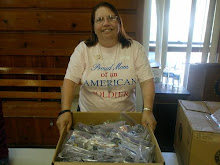January 12, 2009
Los Angeles Times
AL-ANBAR PROVINCE, Iraq -- As U.S. forces work to revive Iraq's tattered farming economy, they seem to have found an effective new weapon.
Cows.
At the suggestion of an Iraqi women's group, the Marine Corps recently bought 50 cows for 50 Iraqi widows in the farm belt around Fallujah, once the insurgent capital of war-torn al-Anbar province.
The cow purchase is seen as a small step toward re-establishing Iraq's once-thriving dairy industry, as well as a way to help women and children hurt by the frequent failure of the Iraqi government to provide the pensions that Iraqi law promises to widows.
The early sign is that the program is working. Widows, many with no other income, have a marketable item to sell, as well as milk for their children. Although Iraqis, particularly women, are often reluctant to participate in an American effort, the cows were immediately popular.
"It was an easy sell," said Maj. Meredith Brown, assigned to the Marines' outreach program for Iraqi women.
The idea, proposed by members of the Women's Cultural Center in Fallujah, at first met with resistance from U.S. military officers and civilian officials involved in aid programs for al-Anbar. Nothing in their training provided guidance in haggling for livestock.
Those objections evaporated when Maj. Gen. John Kelly, the top Marine in Iraq, signaled his support, Brown said. The Iraqis now refer to their animals as Kelly's Cows.
Although Kelly's support might have been based on gut instinct, the need to beef up Iraq's dairy industry was argued in a Nov. 25 report by Land O'Lakes Inc.
The Minnesota cheese-and-butter company was hired by the Marine Corps to examine the Iraqi dairy industry. Its 38-page report, based on field research in the fall by two Land O'Lakes dairy specialists, concluded that there was enormous growth potential for the industry in a milk-drinking, cheese-eating nation that can locally produce enough milk to satisfy only 5 percent of the demand.
The study also pointed out that, even in Iraqi farm families with able-bodied adult males, much of the work is left to women: "Women milk (READ MORE)
Thank You
4 years ago







No comments:
Post a Comment